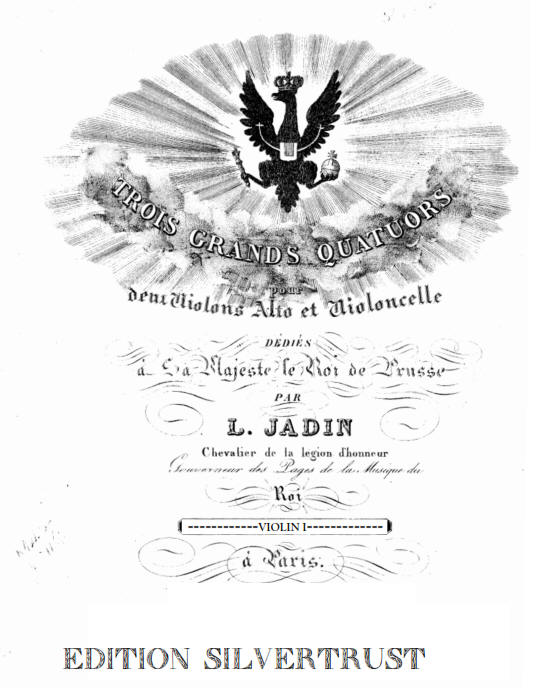Presents
Louis-Emmanuel Jadin
String Quartet No.2 in f minor
 Louis-Emmanuel
Jadin ( 1768-1853) was born at Versailles where his father was a violinist at
the Chapelle Royale. Jadin was taught the violin by his father and served as a
page at the court of Louis XVI. Between 1796 and 1816, he taught at the Paris
Conservatory. By 1820 he had retired (though he lived for another 33 years)
and for the most part stopped composing. During the last decade of the 18th and
first two decades of the 19th century, he was one of France's leading musicians,
highly regarded as a violinist, pianist and as an composer. Jadin wrote a
considerable amount of music including 40 operas and operettas, 4 piano
concertos, sinfonie concertantes, works for wind band, string quartets, piano
music, masses, and songs. the fact that he wrote string quartets, in and of
itself, sets him apart from most of his French contemporaries who, much like the
French musical public, were not, at the time, very interested in chamber music.
Louis-Emmanuel
Jadin ( 1768-1853) was born at Versailles where his father was a violinist at
the Chapelle Royale. Jadin was taught the violin by his father and served as a
page at the court of Louis XVI. Between 1796 and 1816, he taught at the Paris
Conservatory. By 1820 he had retired (though he lived for another 33 years)
and for the most part stopped composing. During the last decade of the 18th and
first two decades of the 19th century, he was one of France's leading musicians,
highly regarded as a violinist, pianist and as an composer. Jadin wrote a
considerable amount of music including 40 operas and operettas, 4 piano
concertos, sinfonie concertantes, works for wind band, string quartets, piano
music, masses, and songs. the fact that he wrote string quartets, in and of
itself, sets him apart from most of his French contemporaries who, much like the
French musical public, were not, at the time, very interested in chamber music.
String Quartet No.2 was composed around 1800 though not published for more than a decade. It was the second of a set of three dedicated to the King of Prussia. In this quartet, it is clear that while Jadin had advanced considerably beyond the kind of melodic writing of the Mannheim School, he had not yet assimilated the harmonic changes pioneered by Haydn and Mozart. Hence, for the most part, the first violin has all of the thematic material, while the other voices provide an accompaniment. Despite this, it is a quartet of historic significance because it is an exemplar of the kind of chamber music which was popular during France's revolutionary and Napoleonic period. In it, we find the older 18th century style combined with the more dramatic melodic writing of the early romantic period.
The first movement, Maestoso moderato, is an excellent example of this synthesis, with its lovely melodies but still structurally wedded to the older structural format. The second movement is a classical Minuetto, of moderate tempo, stately and somewhat sad. Here, however, Jadin does something almost unheard of, he writes the music in what amounts to 10/4 time. The trio is a lovely, country dance. The third movement, Andante moderato, is a subdued French song in three parts. The finale, Allegro non troppo, shares many of the same features as the opening movement, notably its pleasant and sometimes dramatic melodies.
Originally published in 1814, there have been no subsequent editions. Our edition is a reprint of the original. Although we have cleaned it up and made corrections where required, readers should be aware of two things: 1) Even brand new editions of music printed before 1860 were never as readable as modern editions. 2) We were working off of a piece of music over 200 years old. Nothing that old is ever pristine. However, our reprint is a performance edition with proper page turns and quite readable.
Parts: $24.95